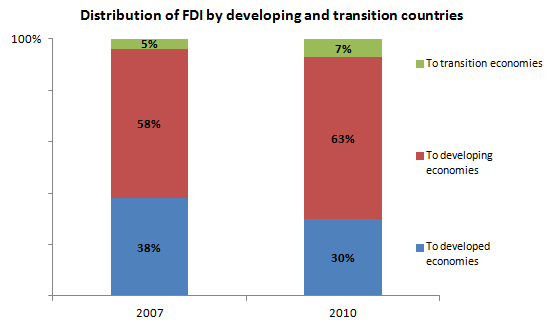Emerging Economies, Private Companies, and Global Economic Power
More on:

In the wake of the 2008 economic crisis, economists, investors, and even politicians have pinned their hopes on the major emerging markets as the new engines of global growth. International Monetary Fund Managing Director Christine Lagarde’s recent visit to Latin America (she has also made the rounds in China, Russia, and Japan) demonstrates this increasingly prominent macroeconomic role. Perhaps a first, the multilateral head came to ask for funds, not lay down rules. But for emerging economies to truly drive global growth, the real engine will be the private sector. While less measured than central bank reserves or monetary flows, anecdotal evidence suggests that this too is happening – with foreign direct investment now flowing from emerging to more mature economies. And it isn’t just China searching for bargains.
A recent example of this worldwide trend includes Mexican-based Grupo Bimbo’s purchase of Sara Lee’s U.S. and European operations for close to $1 billion. The acquisition caps a two decade-long global expansion, buying up brands such as Entenmanns and Thomas’ and establishing plants in places as far flung as Fort Worth, Texas and Beijing, China. Begun by Spanish immigrants, Grupo Bimbo began with a family cake shop on the outskirts of Mexico City. In the post World War II economic boom the Servitje family expanded into breads, cookies, and candies, delivering their wares first in Mexico City, then throughout Mexico, and now throughout the world. Today Bimbo owns plants in 19 countries, and is the largest baker in the United States.
Other recent acquisitions – such as Lenovo’s purchase of German electronics supplier Medion and Tata Group’s buyout of Jaguar and Land Rover – show a similar shift. To be sure, U.S. and European capital still pour into emerging economies – even in the midst of the global recession. FDI from developed to emerging economies nearly doubled from 2007 to 2010. It is not just diplomats but also Wall Street and the City of London that are adapting to a multipolar world. Developing countries are investing abroad more than ever, eating into advanced economies share of overall FDI outflows (down from 84 percent in 2007 to 71 percent in 2010). Most of the investment outflows (almost two thirds) go to their emerging market peers. This, perhaps more than other factors, will lead to the touted “rise of the rest.”
More on:
 Online Store
Online Store